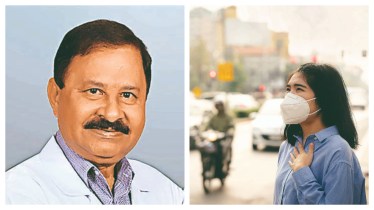If winter maladies were not enough, most metros, where a large population is concentrated, are battling pollution as well. While we all know what it does to our lungs, how does pollution affect our eyes, hair, and skin? Dr DM Mahajan, senior consultant, dermatology, Indraprastha Apollo Hospitals, says: “Air pollution is harsh on the eyes, skin, and hair. It can make the eyes dry, red, irritated, and watery due to contact with particulate matter and chemical irritants, sometimes leading to a higher risk of eye infections or allergies.
The skin suffers oxidative stress as pollution particles cause inflammation, pigmentation, premature wrinkles, acne, eczema, and worsen pre-existing conditions like dermatitis. Hair health declines with pollutant build-up on the scalp and strands, leading to more hair fall, brittleness, and scalp irritation or flakiness-especially during pollution peaks.”
What can be done to check this damage?
Prevention involves minimising outdoor activities and using shields like sunglasses for eyes and head coverings for hair on highly polluted days. Wash skin and hair often with antioxidant-packed products to eliminate pollutant residues and boost moisture, and use broad-spectrum sunscreens for additional skin protection. For eyes, artificial tears and compresses help soothe irritation. Healthy dietary habits-think antioxidant-rich foods, adequate hydration, and vitamin support-can further reduce damage risks.
Routinely checking air quality before venturing outside and building these habits collectively keeps visible and unseen pollution harm in check.
For internal systems, should immunity boosters be taken, as many people believe?
Supplements and immunity boosters, including vitamins C, D, zinc, and herbs like turmeric, can help the body fight inflammation and oxidative stress from pollution. However, their effectiveness is supportive rather than preventive and these do not replace fundamental protective measures against pollution exposure itself. The best defense remains limiting exposure and supporting health with complete routines, not relying solely on so-called immunity-boosting products. Diet, physical protection, and lifestyle practices are vital for truly minimising risks from poor air quality.
Many people eat jaggery thinking it will ‘clean’ their lungs. How misplaced is this notion?
The idea that eating jaggery will ‘clean’ your lungs from pollution is a common but scientifically unsupported belief. While jaggery does offer antioxidants and minerals that can slightly help manage oxidative stress, it does not physically remove pollution particles or detoxify lung tissue. Actual respiratory protection requires avoiding polluted environments, using masks, and prioritising time in clean air rather than depending on dietary remedies. Jaggery as a lung cleanser is largely a myth and should not be used as a primary safeguard against air pollution.
